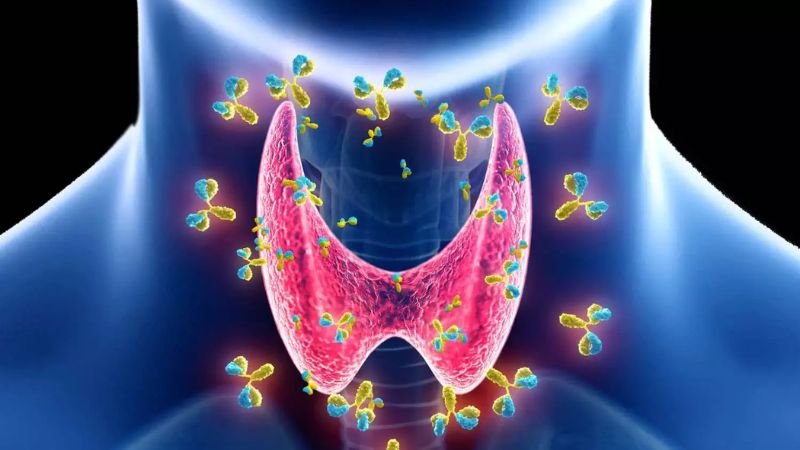Hyperthyroidism is one of the most common endocrine disorders, significantly impacting health and overall quality of life. Understanding the causes of hyperthyroidism is a crucial first step in preventing and effectively managing this condition. This article provides a comprehensive overview of the causes of hyperthyroidism and practical approaches to help prevent and control the disease in a safe and sustainable manner.
1. Understanding Hyperthyroidism
1.1 What is Hyperthyroidism?
Hyperthyroidism occurs when the thyroid gland produces an excessive amount of thyroid hormones—primarily thyroxine (T4) and triiodothyronine (T3). These hormones regulate metabolism, heart rate, body temperature, and digestion. Located at the front of the neck, the butterfly-shaped thyroid plays a central role in maintaining physiological balance. When its activity becomes excessive, various symptoms may arise, ranging from mild to severe.
1.2 Thyroid Regulation Mechanism
The thyroid gland functions under the control of the pituitary gland, which releases thyroid-stimulating hormone (TSH). When thyroid hormone levels drop, TSH increases to stimulate hormone production. However, in hyperthyroidism, this regulatory mechanism becomes disrupted, resulting in abnormally high levels of circulating hormones.

Hyperthyroidism occurs when the thyroid gland produces too much thyroxine (T4) or triiodothyronine (T3).
2. Common Causes of Hyperthyroidism
2.1 Graves’ Disease – The Leading Cause
One of the most frequent causes of hyperthyroidism is Graves’ disease, an autoimmune disorder where the immune system mistakenly attacks the thyroid gland, prompting it to produce excess hormones. This condition accounts for the majority of hyperthyroidism cases, particularly in women aged 20 to 40.
Graves’ disease may also cause eye problems (Graves’ ophthalmopathy), increase the risk of cardiovascular disease, osteoporosis, and neurological issues.
2.2 Thyroiditis
Inflammation of the thyroid gland, or thyroiditis, is another common cause of hyperthyroidism. It can be triggered by viral or bacterial infections or autoimmune reactions, leading to temporary hormone leakage into the bloodstream. In many cases, hyperthyroidism due to thyroiditis resolves on its own within weeks to months.

Thyroiditis is a common cause of hyperthyroidism.
2.3 Thyroid Nodules or Toxic Multinodular Goiter
Benign thyroid nodules or goiters that function independently of pituitary regulation can also be causes of hyperthyroidism. These nodules autonomously produce thyroid hormones, increasing hormone levels and causing typical symptoms.
2.4 Improper Use of Thyroid Hormone Medications
Some individuals may take thyroid hormone supplements to treat hypothyroidism or for weight loss purposes. If these are used improperly or in excessive doses without medical supervision, they may inadvertently become a cause of hyperthyroidism.
3. Clinical Manifestations and Potential Complications
Symptoms of hyperthyroidism may include unexplained weight loss, palpitations, excessive sweating, hand tremors, sleep disturbances, prolonged anxiety, and mood changes. Women may experience menstrual irregularities, while men may face reduced libido.
If left untreated, hyperthyroidism can lead to serious complications such as heart failure, atrial fibrillation, or thyroid storm—a life-threatening emergency. Mental health and quality of life may also deteriorate over time.
4. Prevention Strategies
4.1 Regular Health Screenings
Routine thyroid function tests (TSH, T3, T4) are essential, especially for individuals with a family history of thyroid disorders. Early detection is key to preventing serious complications.
4.2 Balanced Diet
Diet plays a crucial role in thyroid health. Ensure adequate but not excessive iodine intake. Limit foods and substances that overstimulate the thyroid, such as caffeine and highly processed items. Foods rich in selenium and zinc, like seafood, eggs, whole grains, and mushrooms, can support thyroid function.
4.3 Stress Management
Chronic stress can trigger autoimmune responses, including Graves’ disease. Maintaining a healthy lifestyle, getting enough sleep, and practicing regular physical activity can help reduce stress and lower the risk of hyperthyroidism.
4.4 Avoid Self-Medication
Do not self-prescribe or misuse thyroid hormone medications, especially for non-medical purposes such as weight loss. Always follow a doctor’s guidance to avoid potential hormone imbalances.
5. Treatment and Long-term Management
5.1 Treatment Options
Treatment depends on the underlying cause of hyperthyroidism and may include anti-thyroid medications (e.g., Methimazole), radioactive iodine therapy, or thyroid surgery. Each method has its own benefits and risks, requiring evaluation and monitoring by an endocrinologist.

A healthy lifestyle and regular check-ups can help prevent hyperthyroidism.
5.2 Ongoing Monitoring
After initial treatment, patients should undergo regular follow-ups to ensure hormonal stability and prevent relapse. Coordinated care involving medication adjustment, diet, and lifestyle changes is key to effective disease control.
In conclusion, while hyperthyroidism can pose serious health risks, it is preventable and manageable with the right knowledge and proactive care. By understanding the causes of hyperthyroidism, maintaining a healthy lifestyle, and following medical guidance, individuals can significantly reduce their risk and live a healthier, more balanced life in Vietnam or anywhere in the world.








